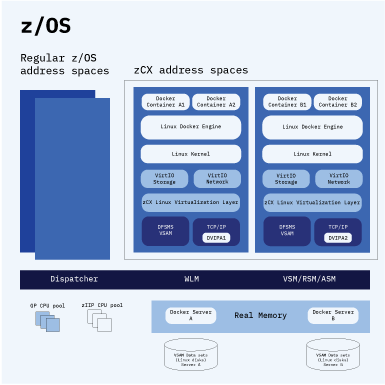What is z/OS Container Extensions?
IBM z/OS Container Extensions (zCX) is a new z/OS 2.4 feature that enables clients to deploy Linux applications as Docker containers on z/OS as part of a z/OS workload. This maintains operational control of the Linux environment within z/OS, brings z/OS qualities of service to the application deployment, and does not require the provisioning of separate LPARs or system images.
IBM zCX expands and modernizes the z/OS software ecosystem by allowing applications and workloads built for Linux on Z and packaged into a Docker image to run on z/OS.
Docker is a framework that bundles an application, along with all of its dependencies and libraries,into one deployable package. It simplifies the configuration and installation of modern software. Dockerhub provides a registry and repository of Docker images that the community of Docker users has created over time. Any Docker image on Dockerhub with a tag of 's390x' or 'IBM Z' has been built for IBM Z, and can deploy either in a Linux on Z, or an IBM zCX environment.
In addition to the open source packages available on Dockerhub, software from IBM and independent software vendors may be available. You can also build your own images using the Docker infrastructure and command line provided by IBM zCX, just as you would on any other platform.
IBM zCX instances are provisioned and managed through the z/OS Management Facility (z/OSMF). z/OSMF workflows guide system administrators and automate the processes necessary to manage the lifecycle of a zCX instance. Once provisioned, Docker users and application developers can operate within a zCX instance as they would in any other Linux-based Docker environment.

For an overview of zCX and a variety of resources, see z/OS Container Extensions.